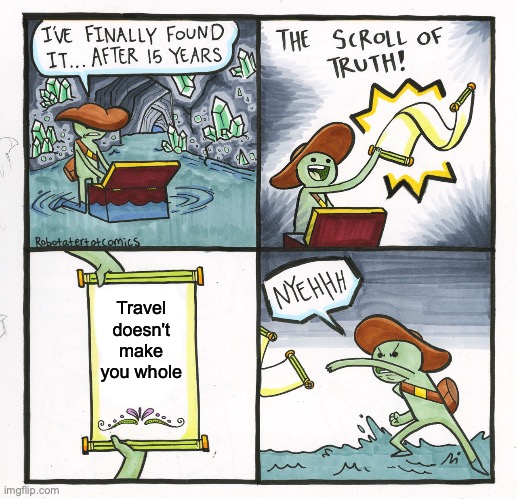I stand in Silom Soi 4, the notorious LGBTQ+ alley in Bangkok's Si Lom district. It's narrow, loud, and bustling. Neon and LEDs shining everywhere. Just before, I was in a bar and made a nice acquaintance, told a couple of stories for the umpteenth time, but nothing came of it. I encounter a half-forgotten face - did we meet in Chiang Mai? No idea. The Pad Thai from the stand around the corner turns out to be pretty mediocre. While I eat the noodles reluctantly, I lean against the wall and watch the crowds.
What the hell am I actually doing here?
It's one big adventure. You meet so many people. See things. Try new food. Go party. Lose yourself by the sea.
A dream, right? If only reality didn't interfere. Six things about solo travel that I only recognized over time.
You have more screentime than you want
A lot more. Because you have to plan/book/cancel/research things all the time. Think about it: You are in a foreign country. You are moving from place to place. So many things that we don't ponder at home - in fact, we don't even think that we could think about them - are suddenly no longer a given on the trip. Where do I sleep? What’s to see here? Can I drink the tap water? Is this vegetarian? Can I use the ticket for buses or just the subway? Damn, my credit card has been blocked, where can I call? The bus for Friday - has to wait until this evening. And I should take care of the visa for Thailand...
Even if the hostel people are the number 1 point of contact: There is always, always something that needs to be sorted out in the ether. Even if I only plan 2-3 days in advance at most. It's impressive how much of everyday life is simply structured by habit.

It's inefficient and expensive
My God. How often have I lugged my laptop-laden bicycle bag around the supermarket because it could easily be stolen outside. How often have I squeezed myself and my backpack into a narrow toilet at some train station – only to have it on my lap while I was taking a shit because the floor was so dirty. How often have I wished, oh, how good it were, would someone plan something for tomorrow and I would take care of cooking.
Some things are easier as a team.
Aside from no one looking after your luggage, you also spend more solo than in pairs or groups. In some countries, especially in rural areas, there are no hostels. So you got to pay the full hotel price on your own. Because overnight stays make up a significant part of the budget, it makes a huge difference.
It can be lonely
You meet new people all the time - and let them go just as quickly. You join a group, do something fun together, and three days later Sam and Aashna are long gone again. It's a never-ending coming and going.
As a result, contacts often remain superficial. That people know it has an expiry date doesn’t exactly help either. More often than expected I was surrounded by people and felt lonely nevertheless. Told where I come from and head to the umpteenth time. I mean, who cares? It’s the same story just in green, blue or black. A bit to my surprise, one thing is true both when traveling and at home: The people that you really connect with are hard to find. All the more reason to enjoy it when it does happen!
Once I spent a week in Goa with a super cool group coming from all over the world. But then, everyone went in a different direction and it would NEVER be the same again. On the night train to Mumbai I was full of gratitude for those days, but not without a hunch of separation pain.
How often loneliness creeps in depends, besides many personal factors, also on your travel style. Because I visited so many countries, I was pretty inflexible with my route. It was always clear that on an overarching level, I have to travel westward. As a consequence, it rarely happened that I could have joined a group without making quite the detour. This is something I’d handle differently next time. I’ll rather visit «only» one or two countries and go more with the flow of whoever I meet there.
You need rest
I think people think that traveling is a never-ending excitement and thrill and madness. Every day an experience. I thought that too at the beginning. But after just a few weeks I realized: Going full power day and night is straining. At first I didn't really regard this thought. FOMO was saying hi. I'm certainly not going to hang around all day, am I? I'll miss something! My body however automatically claimed some rest by getting sick for a few days. Or at least unwell. Later I built in breaks myself by simply staying a little longer in some places.
The slump
And then, there is an entirely different beast. One that is in a league of its own. Hidden far away from your sight, it prepares its attack. A careful listener might hear some rumbling in the deep, but usually it comes out of nowhere.
You are in a top hostel. The lobby is bursting with exciting people. You are doing cool stuff. But something is different. Different than a month ago, and different than you imagine traveling to be. For the last two weeks, a veil has hung between you and your experiences on the road. The moments come and go and blend into a mash that you might stir, but that always looks the same.
Suddenly, it hits you.
You don’t enjoy traveling anymore.
Welcome to the slump!
Previously, I described temporary tiredness. It quickly disappears with a bit of rest. The slump has nothing to do with that. No, I would rather describe the slump as a deep fatigue and dullness that occurs after months of traveling. After all the temples, mountains, beaches, cities and faces, you are completely exhausted. If you do pull yourself together to walk to the «bestest, secretest, beautifulest beach (with cocnut palms)», you merely yawn when you get there. What is awe-inspiring on its own is lost in the mass of experiences. To be clear: From the very beginning, I had the intention of not just checking out the sights (otherwise you’ll be bored after three weeks already), but exposing myself to as many different experiences as possible. In particular, I tried to make friends with locals and spend a few days with them. And yet I ended up in the slump at some point.
I've met so many people going through the slump that I suppose it's a quasi-universal experience for long-term travelers. And the initial reaction is always the same: you wonder what’s wrong with you and you feel guilty. After all, you're on your Great Adventure. You're in an incredibly privileged situation. A tiny fraction of people on this planet can ever experience something alike. You MUST have fun now for God’s sake!
Knowing that this is a luxury problem doesn't make the slump magically disappear, however. Yes, I tried to be grateful all along. But it's probably a part of life that, after a few months, everything becomes the new normal and stops being exciting. Even a trip around the world. If you experience the slump, it's often recommended to slow down. To spend two or three weeks in one place. To do some volunteering. In any case, you have to change something about your travel style. And if the slump doesn't go away for an extended time, it's usually a sign that it's time to go home.
I fell into the slump in Korea. Everything seemed boring. After my China visa failed, I decided to go to Southeast Asia because the backpacking style there is much more social. I realized that that was anyway a better fit for me at that moment than touring alone through China. Thank you, Chinese visa center! And for a while it was amazeballs. But in Bangkok’s Silom Soi 4, the slump appeared out of the crowd and said “hi again”. And this time, deep down I felt that my journey is coming to an end soon. Before that moment, I wanted to «do» India and Pakistan for at least another three months. Instead, I was sitting in a café the next morning, feeling empty and eyeballing plane tickets home. The result was a compromise: I would go to India, but only for one month. And I would also plan for a few destinations there, not wander around completely aimlessly. That worked because the finish line appeared on the horizon. The remaining time suddenly seemed valuable again.
In addition to the mental normalization of travel experiences, I think there is a second, deeper reason why the slump appears sooner or later. It has to do with the purpose of traveling.
Travel makes you grow, but only to a certain point
From day one, it was important for me that my trip be a mix of fun and personal growth. Traveling is sometimes hyped as "finding yourself", well, I hope I never have to look for myself, because that would mean a part of me has been severed beforehand, but jokes aside, there is an ounce of truth in that phrase.
Firstly, you get some distance from your familiar environment and break out of your usual routines. For this reason alone, you can grasp more clearly which parts of your daily life were good for you and which weren’t all that great.
Secondly, there are endless opportunities to confront your smaller and larger anxieties. Shy to talk to people? Afraid of heights? Uncertainty makes your mind go crazy? If you get involved with the journey and don't just hang on your cell phone, you’ll be automatically thrown out of your comfort zone.
Thirdly, and this is central, you meet people who you learn from. Who are a bit more relaxed about things. Who rose to the problem you are struggling with (and yes, all of us struggle with something in our lives. You are not alone). Maybe this is Fumiko, who dared to make a brave career change. Maybe this is Josh, who was able to work through a difficult relationship with his mother. Maybe this is someone completely different for you. Whatever is troubling you, you will find people who overcame exactly that. This is enormously inspiring.
A world trip can therefore show you new paths, no doubt. But actually walking the path - in other words, solving your problem – is nonetheless your own task. And that is precisely what is not possible when traveling, because you are not in the environment where your problem is. Traveling is learning, not creating. In addition, the learning curve flattens. At some point you’ll have met your Fumikos and Joshs. At some point the trip will have shown you what it needed to show you. No matter how many countries you go on to visit, it doesn't change that much anymore. All that's left is the "fun". And that might carry you on for a few more months, but ultimately, it's not enough. The trip morphs into empty escapism.
If you’re experiencing the slump, especially the second or third time, it's a signal that you're probably at that point.
Then, the moment has come to think about what’s next. Maybe it’ll be something completely new, maybe it’ll be the previous with even more conviction. Both cases are good, because in both cases the trip taught you something. What’s sure is that some kind of plan is needed.
There's a time for everything. A time for travel and discovery, but also a time for action. And that’s OK.
